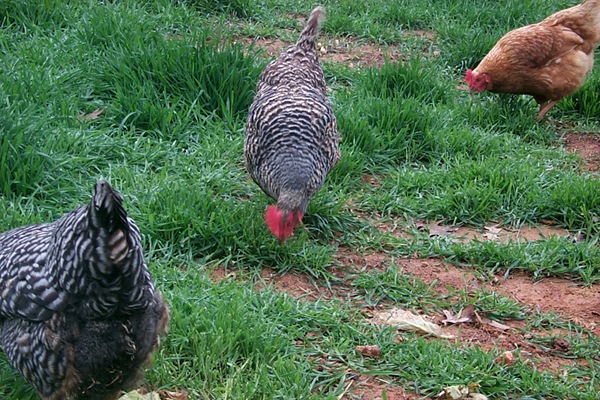Every morning when I let the chickens out, they head straight for the grass and start grazing. I had never really thought of chickens as pasture-loving grazing animals — they’re scratchers. But they love to graze.
I tried to do some research on chickens and grass to try to understand how they can digest grass and what part grass plays in a natural chicken diet. Authoritative sources were scarce, but one source says that chickens will eat up to 30 percent of their calories in grass. They cannot, apparently, digest the cellulose in grass the way cows and other ruminants can. But if the grass is young enough and tender enough, then the chickens can get a lot of food value out of it. Obviously their gizzards grind the grass very effectively and their digestive systems break it down, because there is no sign of grass in the chicken poop.
Grass has a lot to do, it seems, with the nutritional superiority of eggs from pastured hens vs. commercial factory hens. According to Mother Earth News, eggs from pastured hens have much more vitamin D, 1/3 less cholesterol, twice as much omega-3, 2/3 more vitamin A, 1/4 less saturated fat, and 7 times more beta carotene.
I’m hoping that the winter rye grass I planted as a cover crop for the garden will supply the hens with greens for most of the winter.
Part of the miracle of farm ecology is the way farm animals can make human food out of things that are inedible by humans — cows make milk from grass, for example. But chickens, as long as they can run free, can work this magic as well. It’s nice to think about how some of the energy and nutrition in my eggs comes from the grass growing up the hill and not just from laying mash bought at the mill. Even in December, the chickens are still finding plenty of their own food inside the fence around the garden and orchard — about 10,000 square feet. Right now they eat only about half as much laying mash as they do if they’re kept in the coop. During the summer, when bugs were plentiful, the hens’ mash consumption dropped by probably three quarters. Clearly they’ll eat what they can find first and resort to laying mash only as necessary.

3 Comments
Do you feed them crushed rock/shell to assist in their digestion?
I gave them granite sand and cracked oyster shells while they were coopbound. But now that I think about it, though plenty of grit is available to them on the ground, I probably should still give them oyster shells.
I remember my granddad feeding his roaming chickens oyster shells forever
Post a Comment